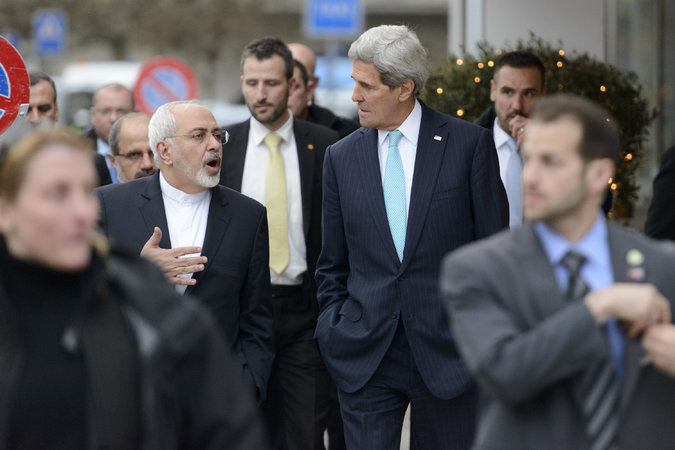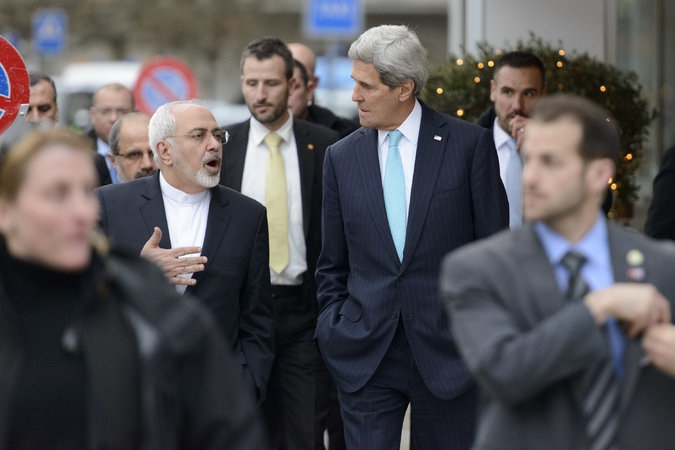 The Iranian foreign minister, Mohammad Javad Zarif, was criticized for the stroll he took with Secretary of State John Kerry in Geneva on Jan. 14. Credit Laurent Gillieron/European Pressphoto Agency[/caption]
The Iranian foreign minister, Mohammad Javad Zarif, was criticized for the stroll he took with Secretary of State John Kerry in Geneva on Jan. 14. Credit Laurent Gillieron/European Pressphoto Agency[/caption]WASHINGTON � When the House of Representatives�opens hearings on Tuesday�about imposing new sanctions against�Iran�� a step that President Obama said would undermine�nuclear talks with Tehran�� the Republicans seeking to hem in negotiators will have some unintended allies 6,000 miles away.
Conservatives in the Iranian Parliament say they are working on a resolution of their own to counter the economic pressure aimed at forcing Tehran�s hand.
The resolutions in the United States Congress would choke off more of Iran�s oil revenue if the talks in Vienna do not end in an agreement by the end of June. The proposals in the Iranian Parliament would require Tehran to deploy centrifuges that can enrich uranium more efficiently than ever.
One measure, described with glee by a senior parliamentary official over the weekend, would increase the production of a form of the nuclear fuel that is just shy of bomb-grade material.
It has become an international game of chicken, with each country taunting the other to violate the terms of a�2013 pact�that established the conditions under which the nuclear talks would take place.
The accord prohibits the West from imposing new sanctions during the talks and Iran from improving its enrichment or bomb-making capabilities. Both sides are �trying to make the other one the first to violate the rules,� one American nuclear negotiator noted recently.
No actual legislation has been introduced in either country. But that seems to matter little in the halls of Congress or the Iranian Parliament. This is mostly about flexing muscles and sending signals.
�Congress is trying to force the administration to adopt a harder line in the negotiations,� said Edward Levine, a former senior staff member of the Senate Foreign Relations Committee.
The Iranians, he said, �are trying something similar.�
In recent days, Iran�s chief negotiator, Foreign Minister Mohammad Javad Zarif, was ordered to explain why he took�a stroll through Geneva�with Secretary of State John Kerry on Jan. 14. They looked a bit friendly in the eyes of the Iranian hard-liners who suspect that Mr. Zarif � a former academic who was educated in the United States � wants a deal a bit too much. Influential Republicans, and a few Democrats, have said the same of Mr. Kerry and Mr. Obama.
The White House and Congress have sparred for years over whether threats of new penalties or promises to ease the crushing sanctions that are already in place would persuade Iran to sign an accord over its disputed�nuclear program.
Mr. Obama has said that Congress should give his negotiators room to strike an agreement in principle. Any effort to impose new sanctions, he says, will be interpreted as a sign that no Congress will ever lift the sanctions, no matter how much Iran gives up in the talks.
Some of the experts set to testify before the House Foreign Affairs Committee on Tuesday say they do not accept the claims against new sanctions.
�These would only come into effect if Iran cheats, or doesn�t make a deal,� said one of the witnesses, Eric S. Edelman, the under secretary of defense in the Bush administration. �I�m skeptical of the argument that unless we do something for Iran, it will walk away from the table. My view is that if the supreme leader wants a deal, there will be a deal.�
The supreme leader, Ayatollah Ali Khamenei, has�publicly expressed doubts of his own, even as he has given his negotiators room to explore the possibilities.
He warned Iranians this month to�prepare anew for a �resistance economy.�His comments suggested that he was bracing the public for more economic pain brought about both by sanctions and the rapid�drop in oil prices, which has done more to break Iran�s budget than any penalty imposed by the West.
But it was also a reminder that any accord actually requires three agreements: between the West and the Iranians, between Mr. Zarif and Ayatollah Khamenei, and between Mr. Obama and the Republicans in the House and Senate.
The complexity of the Zarif-Khamenei and Obama-Republican deals has become particularly evident in the past few days.
The threat to resume high-level enrichment, which would shorten the time it would take Iran to build a bomb, was clearly intended by military leaders and other hard-liners as a signal to Mr. Zarif. He must come back, they are saying, with a deal that ensures Iran�s ability to hold on to much of its nuclear infrastructure � and thus the capacity to assemble a weapon if its leadership decides it needs one.
The move in Congress is a signal to Mr. Obama that the Republican majority is preparing to judge what constitutes a good and bad deal rather than take Mr. Obama�s word for it.
The Iranian Parliament, so suspicious of its own negotiators, will doubtless demand the same.
This article was written by�David E. Sanger for The New York Times on JAN. 27, 2015. David E. Sanger is chief Washington correspondent of The New York Times. �Mr. Sanger has reported from New York, Tokyo and Washington, covering a wide variety of issues surrounding foreign policy, globalization, nuclear proliferation and Asian affairs.
The Iran Project is not responsible for the content of quoted articles.











